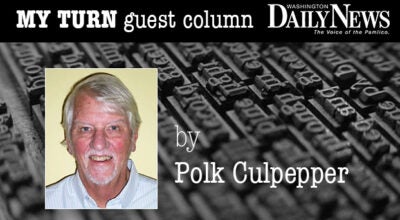Standing with Luther, 500 years later
Published 2:49 pm Friday, November 3, 2017
One day in 1517, a middle-aged Roman Catholic monk, hammer and nails in hand, walked to All Saints Church in Wittenberg, Germany, and posted a placard on its doors. On the placard was written a list of theses, or propositions for debate. At the top of the placard was its title: “Disputation of Doctor Martin Luther on the Power and Efficacy of Indulgences.” The monk’s name, of course, was Martin Luther, and the document has come to be known as his 95 Theses.
Most historians agree with British Christian historian Diarmaid MacCulloch that Luther “did not see what he was doing as particularly important.” He may have intended his list of grievances as nothing more than an invitation to his local religious colleagues to join him in a debate about 16th-century Roman doctrines that he found troubling.
In fact, it may have come as a surprise to him that by publishing his 95 Theses 500 years ago on Oct. 31, Luther sparked a firestorm that engulfed the Western Church, split it in two, and led to the creation of over 33,000 Protestant denominations and organizations throughout the world.
In the early years of his vocation as a Catholic monk, Luther had been filled with inner turmoil. He felt he could never find peace with God and know his sins were forgiven. He repeatedly confessed his sins, sometimes many times a day.
His confessors urged him to trust in God’s benevolent mercy, meditate on Christ’s suffering, and let go of his sins while he trusted in God’s forbearing mercy and grace. But his conscience was exceedingly scrupulous, and he could not allow himself to be forgiven and delivered from his fears of the last judgment.
Luther’s conscience was not eased until he came to believe that forgiveness and mercy come through faith in God through Jesus the Christ. Faith, alone, he argued, not pious acts, church attendance, the purchase of indulgences or even bible study, is sufficient for salvation. Furthermore, there was no need to look to priests for forgiveness because, to those who believed and were contrite, forgiveness was a gift of God. Finally, he was at peace.
But not for long. Those in positions of ecclesiastical power, the Pope, cardinals and bishops, saw Luther and the movement he brought into being as a threat to church doctrine and their authority. In 1521, church authorities called upon Luther to publically defend his attacks on orthodox Catholic beliefs, especially those having to do with indulgences. In April, Luther was ordered to appear before the Emperor of the Holy Roman Empire and the Diet of Worms (“diet” then meant a formal meeting, not a weight-loss plan). The stakes for Luther could not have been higher. If found to be a heretic, he would be burned at the stake.
Perhaps the most climatic moment of the trial occurred when the Emperor demanded to know why Luther had written the “blasphemous” books piled on the table before him and why he could not recant their content. Luther replied simply: “Here I stand; I can do no other. God help me.”
There is a lesson in Luther’s refusal to recant for all those who face persecution from autocratic government and religious organizations that demand conformity of belief and allegiance: stand your ground. Demand to be heard. Protest injustice and discrimination with all your might. Put your body if you must, between tyranny and freedom. Demand that your ideas, even if rejected by those in power, be treated with respect and dignity.
Luther protested the tenets and actions of an unjust and corrupt ecclesiastical regime. Today, both Protestants and Roman Catholics are called to do the same whenever and wherever injustice, discrimination, corruption and inequality threaten the poor, needy, marginalized and least.
By doing so, we align ourselves with the man upon whom the Church is founded and the church of the first three centuries who both refused to live according to the rules of the day. Standing with the least, we believe with the early church that we are called to a bolder and more perfect reflection of the dignity of humanity as we have seen it represented in a heretical Jew who’d once moved among them and left a residual and radical idea of what community should look like.
Polk Culpepper is a retired Episcopal priest, former lawyer and a Washington resident.



